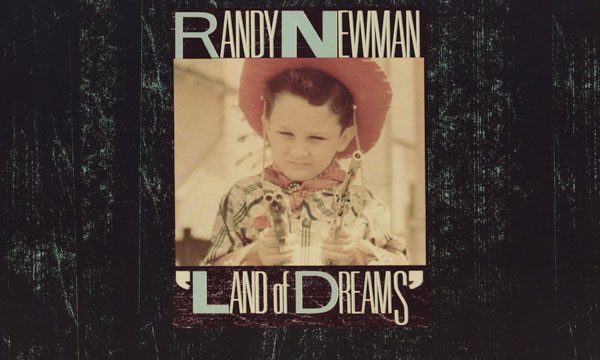Land of Dreams contains both one of Randy Newman’s all-time best and worst songs – making for a rather interesting artistic portrait, indeed.
But we’ll get to these songs in a moment. For now, it’s worth mentioning that, when it was released, Land of Dreams raised eyebrows when it was announced that Newman – who always wrote in character and used that device as a way to shine a light on some of the uglier parts of the American psyche – was writing autobiographical songs.
Well, not exactly. After the opening three songs that draw (at times, somewhat loosely) on his childhood, Newman went back to his familiar songwriting mode. But these three songs take a more personal look at a child experiencing the things, such as religion, racism, and bullying, that Newman often wrote about on previous records. In the first song, “Dixie Flyer,” we get a striking portrait of his grandmother, “Her dress as black as a crow in a coal mine,” before we find out that her Southern Jewish family is trying to pass as Christian. The second song, “New Orleans Wins the War” frames the South’s well-documented historical amnesia in a hazy, Technicolor memory: “Blue, blue morning, blue, blue day/All your bad dreams drift away.” The third song, “Four Eyes,” has an amazing introduction that captures just how fucking scary a parent’s tough-love pep talk sounds to a child before his first day of school, which, of course, does nothing to ease the pain of being taunted by his peers.
Then, the masterpiece. “Bad News from Home” is an under-three-minute blast of hard-boiled noir. Over an ominous, circular chord progression, the hapless narrator watches the betrayal in front of him with a nightmarish vividness:
At the end of this bone-white gravel road
They both lie sleeping on a feather bed
And her hair’s as black as the sky at night
But her eyes are gray like the moon
A career highlight, Newman never wrote anything like this song, before or since.
Yet he never wrote anything as spectacularly bad as “Masterman and Baby J.” What is intended to be a late-80s parable about escaping the horrors of ghetto life devolves rapidly when Newman tries to imitate the vocal cadences of an aspiring Black rapper – and, if that doesn’t completely sink the song, the overdone turntable scratching surely does.
That Newman was also known for having lengthy bouts of writers block perhaps explains how he could be conflicted about where to take a song. “Bad News” makes the wise decision to leave us with the narrator’s simmering rage: “You can run but you can’t hide . . . You said you loved me, but I know you lied.” On the other hand, “Masterman” exhibits Newman’s penchant for taking highly conceptual satire to perverse lengths in a not very flattering light.
Slotted in between Newman’s best and worst song is “Roll with the Punches,” which uses the anachronistic imagery of a minstrel show in a far more toxic way than the kinder, gentler treatment on “New Orleans Wins the War.” As the narrator in “Roll with the Punches,” Newman voices a conservative patriot’s typically self-serving argument for the American Dream – and, as it turns out, the narrator is introducing a Black child tap dancer, who is being crassly marketed as an entertainment act. This imaginative historical narrative appeared to scandalize those used to the cool amorality of sex, drugs, and rock ‘n’ roll. The album reviewer for Rolling Stone called “Roll with the Punches,” “one of [Newman’s] most disturbing portraits of callowness.”
Another problem is Newman’s unsuccessful attempts to hide some of his weirder ideas in the plain sight of contemporary production trends. The song that follows “Masterman,” “Red Bandana,” an unholy mess of chirpy synth sounds, only really took off when he stripped it down and played it at a show in the 2000s that I saw – he hammered home with delight the bluesy riff, even shouting to the crowd as the final note faded, “That was dirty!”
What saves Land of Dreams from getting no more than a mixed review is Newman’s going big at the end. If Trouble in Paradise, his last album, made five years earlier, closed with a profoundly anti-nostalgic elegy for Vietnam, Newman closes Land of Dreams with “I Want You to Hurt Like I Do,” a strychnine-laced ballad that takes dead aim at the pathos of “We Are the World” – that 1985 spectacle of sappy liberal do-goodness. Here is another monster produced by the land of dreams, a guy whose strongest feelings are manifested by abandoning others.
“I Want You to Hurt,” of course, can have a between-the-lines reading as commentary on Newman’s own failed relationships, as if only by fanning the flames of his own self-hatred can he face the cultural void of the George H.W. Bush years. But, hey, that’s life as a sardonic songwriter. Newman goes as far as to remind us, in the title of the preceding song that cries crocodile tears for the hardships of NPR listeners everywhere: “It’s Money That Matters.”

